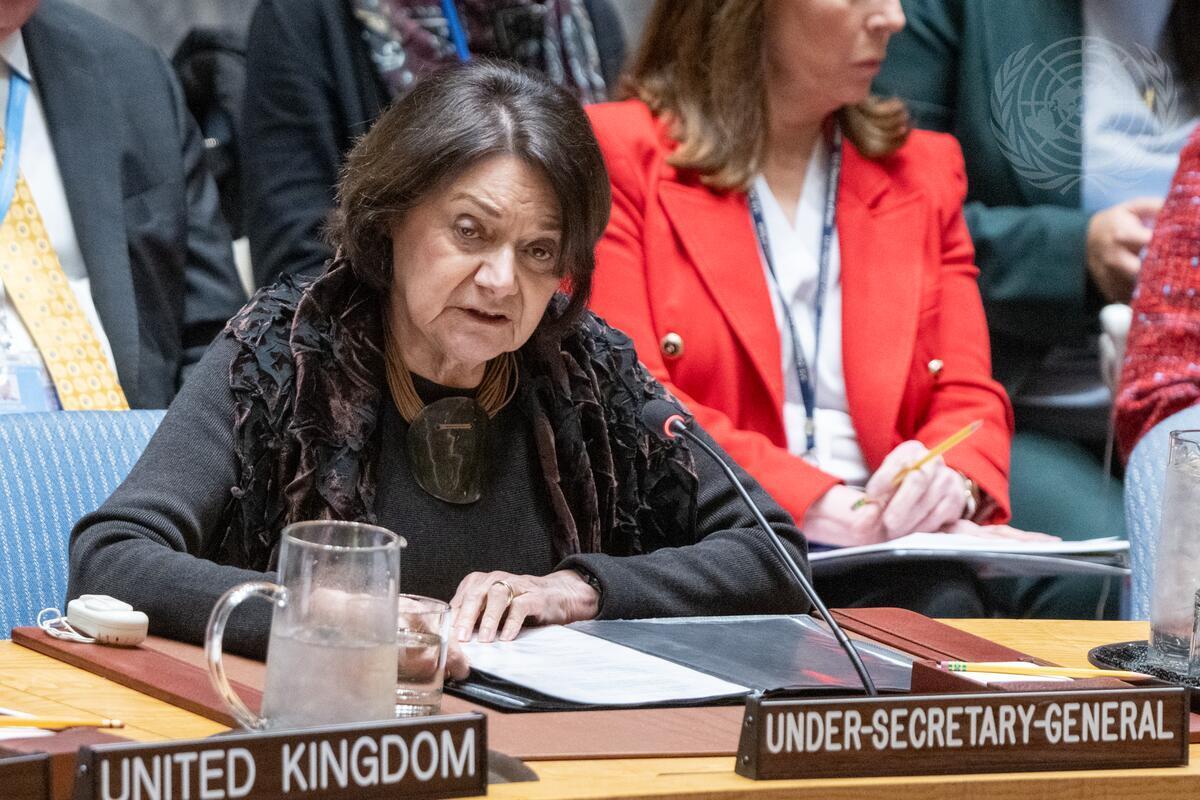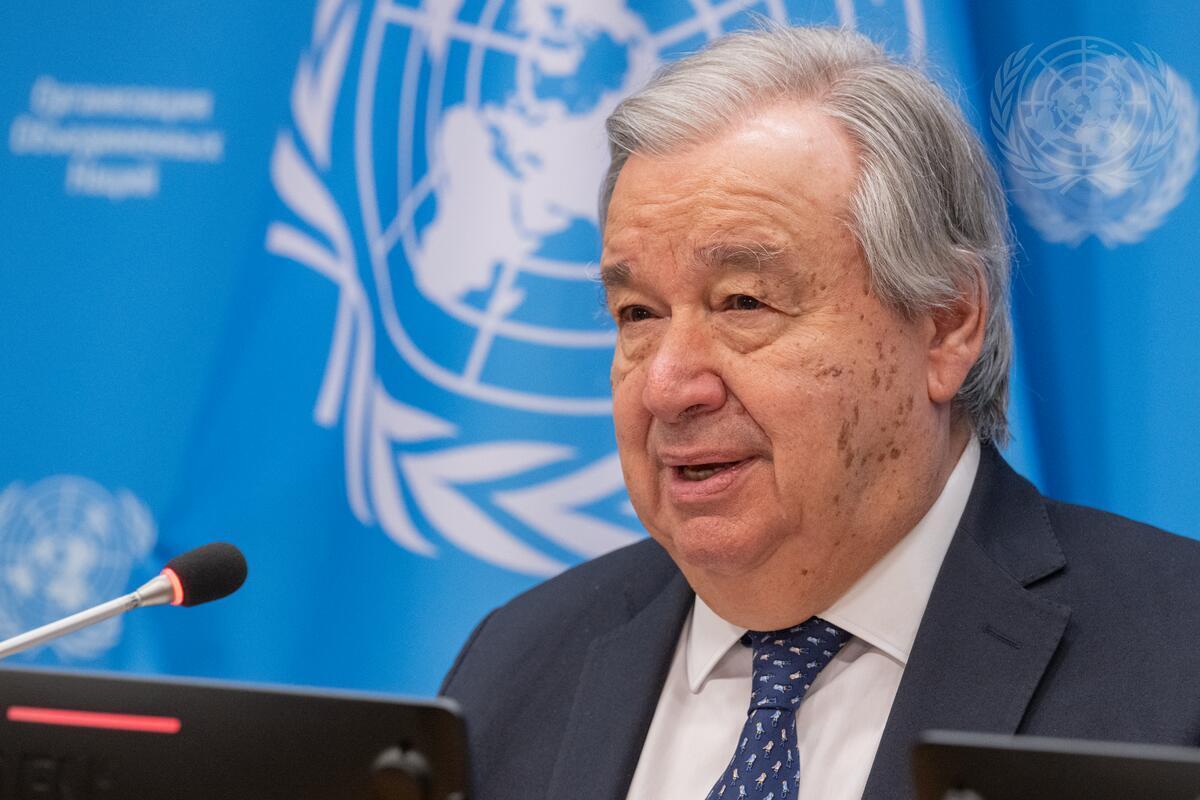Mr. President,
Members of the Security Council,
On behalf of the Secretary-General, I devote my regular briefing on the situation in the Middle East to presenting the sixth report on the implementation of Security Council resolution 2334 (2016). As you have received the report already, I will highlight some of the developments on the ground and ongoing United Nations efforts in response. Please note that all developments are taking place in the broader context of continued military occupation of the Palestinian territory, uncertainties about the future of the peace process and the two-state solution, as well as instability and continued turmoil in the region.
Mr. President,
As detailed in the report, no steps were taken during the reporting period to “cease all settlement activities in the occupied Palestinian territory, including East Jerusalem” as demanded by the resolution.
Some 3,500 housing units in settlements in Area C of the occupied West Bank were advanced, approved or tendered. One-third of those units are in settlements in outlying locations deep in the West Bank. Plans for 2,300 units were advanced in the approval process, plans for 300 units reached final approval stage, and tenders were announced for about 900 units. As in the previous reporting period, no advancements, approvals or tenders were made in occupied East Jerusalem.
Today in fact the Israeli Central Bureau of Statistics released data on construction starts in West Bank Area C settlements during the first quarter of 2018. This quota saw the lowest quarterly figure in six years - 250 units. The figure is significantly lower than the average monthly rate during 2017 (410) and 2016 (766).
The reporting period has also witnessed an overall increase in demolitions across Area C compared to the previous period, albeit at the relatively low rate which has characterized the past year. The authorities demolished or seized 84 Palestinian-owned structures, resulting in the displacement of some 67 people and potentially affected the livelihoods of 4,500 others.
I reiterate that all settlement activity is illegal under international law. It continues to undermine the practical prospects for establishing a viable Palestinian state and erodes remaining hopes for peace.
I also reiterate the call of the UN Humanitarian Coordinator for the plans to demolish Khan al-Ahmar – Abu al-Helu to be canceled. Not only is the community at imminent risk of demolition and displacement, but it also sets a significant precedent that many other Bedouin and herder communities in Area C can be affected from.
Mr. President,
The reporting period was characterized by high levels of violence, including rocket attacks from Gaza, as made clear in my recent briefings to this Council on 26 April, and on 15, 23 and 30 May.
Since March 30th, during a series of protests in Gaza 135 Palestinians were killed by Israeli security forces. Hamas and Palestinian Islamic Jihad (PIJ) have acknowledged that a number of their members were among those killed. Two Israeli soldiers were also injured during the protests, with at least five other people lightly injured as a result of rockets and mortars launched from Gaza.
Under the cover of the protests Hamas, PIJ and other militants have engaged in violent and provocative acts. Hundreds have approached and attempted to breach the fence, burned tires, threw rocks and fire bombs at Israeli forces, launched incendiary kites and laid improvised explosive devices (IEDs) at the fence. Palestinian protesters also damaged and looted equipment and installations on the Gaza side of the border at the Kerem Shalom crossing.
We have extensively reported and underlined to this Council the respective responsibilities of parties involved in this latest round of violence. I want to again reiterate the call of the Secretary-General on all to unequivocally condemn, in the strongest possible terms, all actions that have brought us to this dangerous place and led to the loss of so many lives in Gaza.
Israel has a duty to protect its citizens but must to so while exercising maximum restraint in the use of live fire, and to not use lethal force, except as a last resort against imminent threat of death or serious injury. The actions of Hamas, Palestinian Islamic Jihad and other groups in Gaza put at risk not only the lives of Israelis and Palestinians alike, but also efforts to ensure a livable future for people of Gaza. They must prevent the launching of rockets and breaching of the fence.
The prevailing lack of decisive steps towards the return of the legitimate Palestinian Government to Gaza, despite Egypt’s best efforts to revive the process, is detrimental to Palestinian aspirations to statehood, contributes to the worsening of the humanitarian crisis and risks escalation.
Further, the recommendation by the Palestinian National Council to suspend key elements of the Oslo Accords, if implemented, would add to the negative trends making a return to meaningful negotiations even more difficult.
Last week thousands of Palestinians demonstrated in Ramallah in solidarity with Gaza and its residents, demanding an end to the measures imposed by the Palestinian Authority on Gaza, an end the political division, and a lifting of the debilitating closures.
Palestinians have a right to freely express themselves, and the Palestinian Government has the responsibility to guarantee their exercise of this right in accordance with the Basic Law and the International Covenant on Civil and Political Rights, to which Palestine acceded in April 2014. Unfortunately, on 13 June, Palestinian Security Forces prevented media from covering the protests and used tear gas and stun grenades to disperse demonstrators, injuring and arresting dozens of protestors.
The reporting period also included several notable prosecutions by Israeli authorities of Palestinians and Israelis for membership in terrorist cells. On 29 March, an Israeli court convicted an Israeli national of membership in a terrorist organization for participating in a price-tag attack against Palestinians. On May 1st, three Palestinians were indicted for planning shooting attacks in the West Bank under the guidance and sponsorship of Hamas. On 27 May, indictments were filed against Palestinians suspected of being members of a cell planning attacks against high-level targets; and on 17 June suspected Palestinian members of another cell, reportedly operated by Hamas as well, were indicted for preparing large bombing and suicide attacks in Israeli cities.
Mr. President,
Provocation, incitement and inflammatory rhetoric continued during the reporting period. On April 30th, during his opening speech at the Palestinian National Council, Palestinian President Abbas made a series of anti-Semitic statements that were widely condemned by the international community. At the height of the Gaza protests, a senior Hamas official called on protestors to “take down the border and tear out their [Israelis] hearts,” one of several public calls by Hamas leaders inciting protestors to violence, including on social media. meanwhile, Fatah’s official social media pages continued to glorify the perpetrators of past terror attacks.
Israeli officials also made provocative statements. These included calls for the annexation of the settlements, denying that the Palestinian territories were occupied and to openly rejecting the Palestinian right to statehood.
Mr. President,
I continue to engage with all sides to advance the proposal previously outlined to the Council that would look at: 1) prioritizing projects agreed over the past two years by the Ad-hoc Liaison Committee; 2) enhancing UN project management capacity on the ground; and 3) strengthening coordination with the Israeli, Palestinian, and Egyptian authorities. I would like to reiterate my appreciation to all counterparts for the goodwill and cooperation thus far. Gaza remains an integral part of the future Palestinian state.
I welcome Egypt’s decision to open the Rafah border crossing, which enabled some 14,000 Palestinians to cross into Egypt, and over 3,300 back into Gaza, and hope that the security situation in Sinai will allow for this opening to be sustained.
I also take this opportunity to reiterate my call to Hamas to provide full information on the Israeli nationals who are being held in Gaza, as required by international humanitarian law.
Facing an unprecedented shortfall of over USD 250 million, UNRWA is weeks away from painful cuts to its emergency assistance for Gaza and elsewhere in the region. In Gaza itself, this would include a deferral of salaries to some of its workforce in July and the start of suspending core operations in August. UNRWA and its stakeholders are making every effort to ensure that essential operations continue. To this end, a pledging conference will be held here in New York on the 25th June.
Mr. President,
In closing, I remain greatly concerned by the state of our collective efforts to advance peace and I reaffirm the commitment of the United Nations to the Middle East Quartet, which remains the pre-eminent forum to discuss perspectives for resolving the Israeli-Palestinian conflict. Given the interconnected nature of conflicts throughout the region and the iconic nature of the Palestinian-Israeli conflict that can feed extremist narratives, creating the conditions for the parties to return to meaningful negotiations remains critical.
The Secretary-General has consistently spoken out against unilateral measures, which jeopardize the prospect for peace. In its resolution 2334 (2016), the Security Council “underlines that it will not recognize any changes to the 4 June 1967 lines, including with regard to Jerusalem, other than those agreed by the parties through negotiations.”
The need to reverse, or at the very least contain the impact of, negative trends, especially illegal settlement activity, violence and incitement, is critical not only to preserve hope for a meaningful return to the negotiating table, but also to prevent the escalation of broader regional tensions.
I urge key regional and international partners to re-engage and remain steadfast in pursuit of ending the occupation and realizing a two-state solution, in line with relevant United Nations resolutions and previous agreements.
Thank you.






